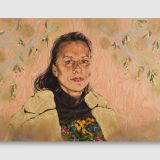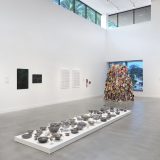Hakeem Adewumi The Art of Anti-Portraiture
February 24, 2021
A couple weeks ago, Chapman students, faculty, staff and communities had the opportunity to hear Hakeem Adewumi, a Texas-based Nigerian artist, photographer and creative director, in conversation with Assistant Professor of Africana Studies Angelica Allen during a lecture for Wilkinson College’s Engaging the World: Leading the Conversation on Race series. Several of Adewumi’s striking portraits were acquired by the Escalette Collection this year through a generous donation by the Ellingson Family.
Hakeem Adewumi is a portrait photographer based in Dallas, Texas. He received his degree in African & African Diaspora Studies from the University of Texas at Austin and traveled to South Africa as part of a Fulbright Fellowship. His practice is centered on the formation and expression of identity, specifically the intersection of race and sexuality. Adewumi’s work captures intimate moments of resonance between individual experiences and shared histories as part of his exploration of Blackness in the United States and around the globe.

Hakeem Adewumi, “we were alone, we were not afraid,” Archival ink on Hahnemühle photo rag, 2019. Purchased with funds from the Ellingson Family.
In his presentation, Hakeem Adewumi touched on some aspects of his work that challenge traditional portrait photography, one of the most obvious being that his subjects are often not facing the camera. Adewumi defines his work at “anti-portraiture,” a term used to describe artwork that rejects the idea that portraiture has to “provide a visual or psychological likeness or an expression of personal, familial or social identity” that is typically associated with “the privileged individual subject of Western modernity” (Anti-Portraiture: Challenging the Limits of the Portrait by Johnstone and Imber). Adewumi describes how anti-portraiture is a means to prevent his work from becoming easily digestible – something that the viewer can identify and understand in one look.
“[Viewers] automatically render and flatten these images and try to compartmentalize what these are expressions are trying to convey. But I really want to leave room for the complexity… If you can’t read their faces you can’t really know what’s happening, and I really want to make sure I complicate that in my work.”

Hakeem Adewumi, “Untitled,” Archival ink on Hahnemühle photo rag, 2020. Purchased with funds from the Ellingson Family.
In, we were alone, we were not afraid, for example, the intimate, luscious details of the photograph invite us to engage with the subjects, but, ultimately, our inability to identify the subjects places us at a distance. The photograph evokes powerful feelings of love, embrace, connection, vulnerability, and more, but we are unable to pin these emotions onto a knowable person, place, or context.
Anti-portraiture is also a way for Adewumi to preserve the privacy of his subjects (which often include himself). Adewumi’s portraits are predicated on developing an open friendship with all of his subjects. When capturing intimate moments, Adewumi ensures that part of that experience is left to the subject. Unlike typical photographs that present the subject as something to be consumed by the viewer, Adewumi’s work dignifies subjects with privacy. In this way, his works reverse the usual power structure wherein the viewer consumes and the subject is passively displayed. The subjects in Adewumi’s work have a power over us, withholding as much information as they give.
Challenging the power structures inherent to photography is especially important within the context of photographing Black communities. Adewumi recognizes that historically, photography has been used as a weapon against the people of the African diaspora, often serving as a predatory means to “other” Black subjects for the entertainment or judgement of white viewers. In changing this relationship between photographer, subject, and viewer to one “built with as much love and care as possible,” Adewumi redefines how photography engages with Black and Queer communities around the world.
Watch the recording of of Hakeem Adewumi and Angelica Allen’s discussion here.
We invite you to explore all the works in the Escalette Collection by visiting our eMuseum.
Wilkinson College of Arts, Humanities, and Social Sciences is the proud home of the Phyllis and Ross Escalette Permanent Collection of Art. The Escalette Collection exists to inspire critical thinking, foster interdisciplinary discovery, and strengthen bonds with the community. Beyond its role in curating art in public spaces, the Escalette is a learning laboratory that offers diverse opportunities for student and engagement and research, and involvement with the wider community. The collection is free and open to the public to view.


